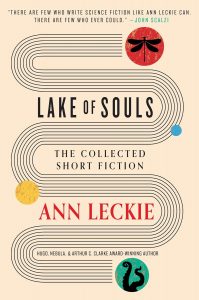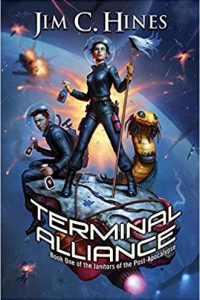Gary K. Wolfe Reviews Lake of Souls: The Collected Short Fiction by Ann Leckie
 Lake of Souls: The Collected Short Fiction, Ann Leckie (Orbit 978-0-3165-5357-5, $29.00, 416pp, hc) April 2024.
Lake of Souls: The Collected Short Fiction, Ann Leckie (Orbit 978-0-3165-5357-5, $29.00, 416pp, hc) April 2024.
In a Locus interview last year, Ann Leckie noted that, prior to Ancillary Justice, “Nobody paid much attention to my stories,” and she was neither complaining nor being falsely modest. While a few of the stories in Lake of Souls: The Collected Short Fiction made the Locus recommended reading list or best-of-the-year anthologies, it seems fair to say that Leckie was hardly a widely discussed writer before her stunning first novel. None of this has anything to do with the generally fine quality of those stories, though. Another reason might simply be that the “collected stories” of a career dating back to 2006 consists of only 18 selections (omitted are a handful of stories, three of which were collaborations with Rachel Swirsky), and more than half of those take place either in the “Imperial Radch Universe” or the fantasy world of The Raven Tower. None of those novels are in any sense prerequisites, however, and in fact all seven of the Raven Tower tales were published before that novel appeared in 2019, giving us a clear sense of how Leckie developed this world and its rules, and dispelling the notion (which briefly made the rounds back then) that Leckie had somehow made an abrupt left turn from SF into fantasy.
Almost as if to show us that she’s far more than a two-universe pony (okay, that’s admittedly a metaphor that doesn’t mix), Leckie opens the collection with eight stories that demonstrate a broad grasp of SF and fantasy themes and forms. Her first published story, “Hesperia and Glory”, adopts the slightly formal tone of post-WWI ghost stories in telling of a strange visitor who claims to be an exiled prince from an ancient Martian civilization with distinctive echoes of Burroughs and Brackett. Two of the stories invoke the old space-opera chestnut of the sole survivor of a crash landing on an alien planet, but “Lake of Souls” – original to the volume – counterpoints the spaceman’s point of view with a surprisingly moving coming-of-age tale of Spawn, the “lobster dog” alien who encounters him, while “Footprints” is a short but chilling vignette involving an illusory little girl and her teddy bear. Another short-short, “The Sad History of the Tearless Onion”, is a slight if clever parable of unanticipated consequences. Far more substantial are “The Justified”, a far-future adaptation of the Egyptian tale of Sekhmet, in which the powerful Het is called back from exile to root out threats to the elite of the story’s title, particularly among the “single-lived”, but whose brief encounter with a pair of small children shifts her perspective. “Another Word for World” begins as a familiar-looking tale of ostensible enemies forced to depend on each other to survive (after another crash landing!), one a Sovereign of a planet’s native population, the other an emissary of refugees who have settled there. The title may echo Le Guin, and so does what emerges as the story’s central theme – communication, and how dependence on a faulty (or misprogrammed) auto-translator (another old favorite SF gadget) can change history.
Readers of the Ancillary series might find a few Easter eggs in the three stories set in the Imperial Radch Universe – unlike the Raven Tower stories, all of these were published after Ancillary Justice – the best of which are “She Commands Me and I Obey”, in which a space-hockey sort of sports competition in a vast space habitat reveals complex political rivalries, and “Night’s Slow Poison”, a classic space opera in which a months-long voyage slowed down by a mysterious region called “the crawl” highlights further political intrigue. But it may be the seven Raven Tower stories that most clearly show Leckie’s skill at deploying various techniques in the service of incremental world-building. Having given herself a set of ground rules – thousands of gods can inhabit anything from frogs to horses to rivers, but they depend on prayers or sacrifices for their power and are incapable of lying – Leckie gives herself leeway to range from the comic to the almost gruesome. A frog-god in “The Unknown God”, for example, partly makes a living marketing excretions as a skin moisturizer (though the story itself focuses on a god of horses trying to reverse an earlier, ill-advised curse). The most delightful story in the collection, “Saving Bacon”, is an almost Wodehousian rom-com in which the scion of a privileged family goes to great lengths (and enlists the aid of some of those small gods) to avoid an arranged marriage. But another arranged marriage, in “The Snake’s Wife”, results in a grim but powerful tale involving castration, rape, and the dark side of some of those same gods. “The Nalendar” is very nearly a caper story involving the search for the lost treasure of a river god, while other stories explore the various ingenious ways in which humans and gods negotiate for power within the tricky confines of those ground rules. Throughout, there’s a sense of a restless imagination at work, and of a writer exploring her options, often in ways that will surprise the admirers of her more famous novels, and often in ways that will reassure them they were right in the first place.
This review and more like it in the March 2024 issue of Locus.
 While you are here, please take a moment to support Locus with a one-time or recurring donation. We rely on reader donations to keep the magazine and site going, and would like to keep the site paywall free, but WE NEED YOUR FINANCIAL SUPPORT to continue quality coverage of the science fiction and fantasy field.
While you are here, please take a moment to support Locus with a one-time or recurring donation. We rely on reader donations to keep the magazine and site going, and would like to keep the site paywall free, but WE NEED YOUR FINANCIAL SUPPORT to continue quality coverage of the science fiction and fantasy field.
©Locus Magazine. Copyrighted material may not be republished without permission of LSFF.






